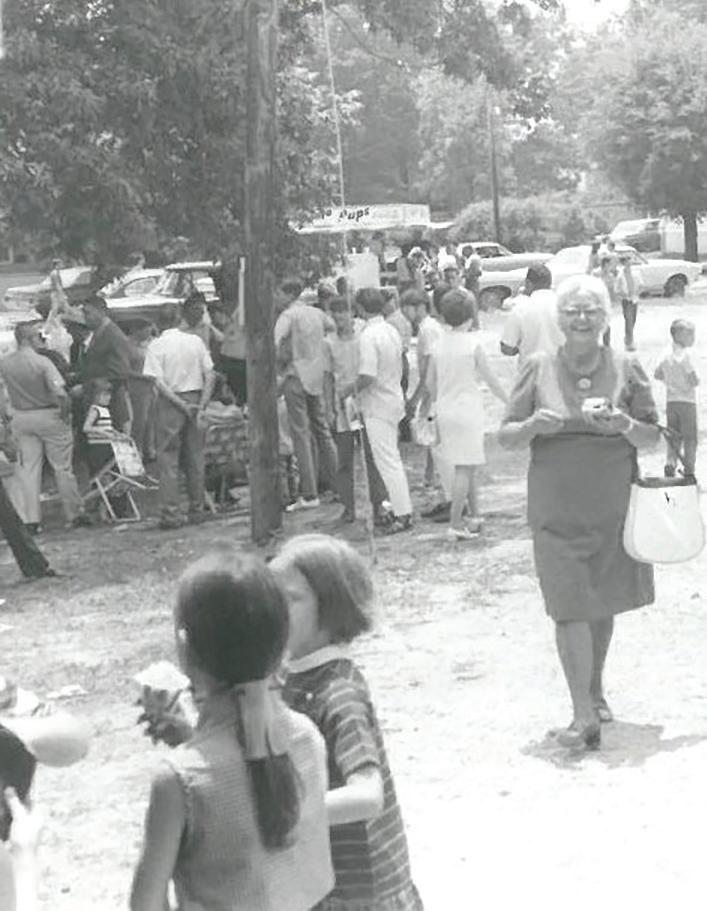
14 minute read
FINGER BBQ: THE DADDY OF ALL BARBEQUES CELEBRATES 123 YEARS

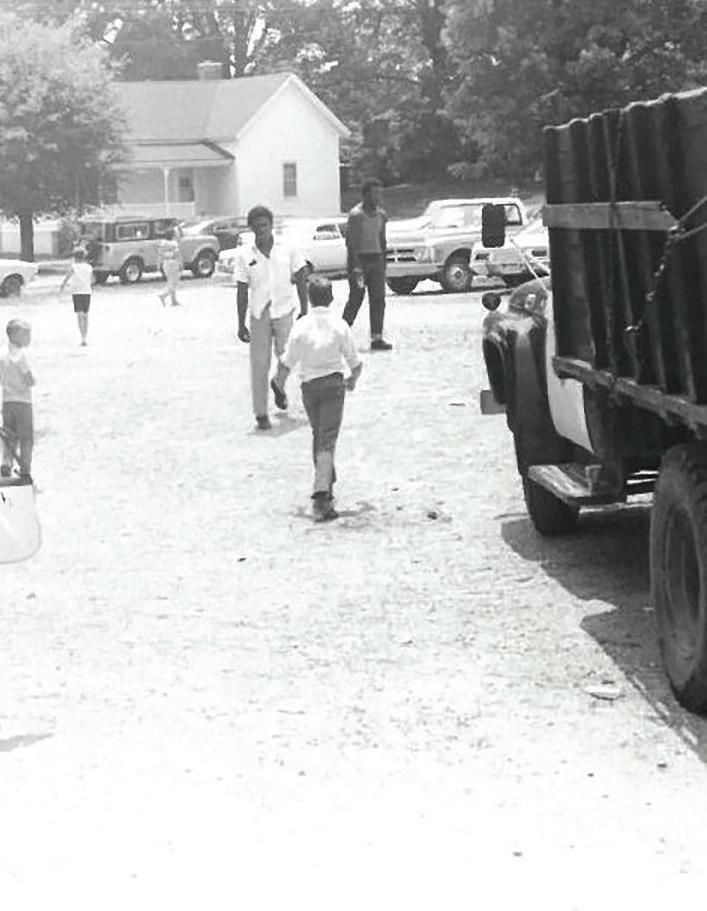
Advertisement
Between 1823 and 1895, the area around present-day Finger, Tennessee, in McNairy County, was dotted with small settlements. Places like Anderson’s Store, Tar Creek, Cotton Ridge, Mount Carmel and McIntyre’s Switch, among others, were home to small groups of settlers. These small settlements usually consisted of a few scattered homes, a trading post or general store and post office little more. These little settlements continued to grow as did the countryside around them.
By the time of the Civil War, the area was full of farms and a few plantations such as the Ingraham, Anderson and Tisdale plantations. McIntyre’s Switch, often referred to as McIntyre’s Crossing, was located along the banks of Huggins Creek on the Mobile and Ohio Railroad. It was a small sparse settlement consisting of a grist mill operated by Robert Thompson McIntyre, a few scattered homes and the shops of a few tradesmen including a carriage maker and a blacksmith. However, by the early 1890’s, the area was becoming more populated and the need arose for a post office. However, the name of the community did not satisfy the United States Post Office Department. Instead, the citizens of the area were charged with coming up with a name for the new post office which, in turn, would result in the renaming of the settlement. Many names were considered and according to local oral tradition, a meeting was held to discuss the name of the new post office and they arrived at “Finger.” The new town had a new name, a new post office and promise of a bright future.
In the same year, 1895, in what is thought to have been a celebration of the area’s new name and new post office, the Finger Barbecue and Picnic was held for the first time ever. This first barbecue and picnic was held on the John A. McIntyre farm east of the present town in the bottom ground near Bushel Creek. McIntyre was the son of Robert T. McIntyre, the founder of McIntyre’s Switch, and himself a leading influence in the area. The big event was held on McIntyre’s farm for only a year or two, but no more.
No later than 1897, the Finger Barbecue and Picnic was moved to the grove where Dr. W.M. Barnes’ home was later built. It was held in this flat open grove for several years including the first several years of the twentieth century. At the time, no home stood on the site and it could accommodate large crowds and was within walking distance of the Mobile and Ohio Railroad and Depot. Arthur “A” Williams, a Bethel Springs businessman, attended the barbecue from 1901 to 1910. In 1901, he estimated the crowd to be anywhere from 6,000 to 10,000. A Ferris wheel was erected that year for the enjoyment of the crowd. Another interesting attraction that year was the sight of Professor Nicholas B. Hardeman, a popular minister and a namesake for nearby Freed-Hardeman University, preaching one of his great sermons.
Politicians and orators regularly took the stage at the Barbecue to entertain and enlighten the crowds. Speeches covered all sorts of subjects: politics, culture, popular entertainment, issues of the day and good old-fashioned story-telling. According to the old Memphis News-Scimitar newspaper, six to eight thousand people heard Mr. T.B. Whitehurst, a leading attorney of the Selmer bar, speak on the subject of “Railroad Domination and Its Evil Effects” at the August 1905 Finger Barbecue. This was ironic. For one thing, Finger is located on the Mobile and Ohio Railroad. For another thing, that very railroad brought large numbers of spectators to Finger to enjoy the festivities and hear Mr. Whitehurst expound on the evils of such railroads. The crowds were thick before the stage and packed in a tight formation awaiting the next speaker. Linen and seersucker suits, straw boaters, outraised hands and deep voices proclaiming many messages were common sights on the stage in those heady days. It is difficult today to appreciate the entertainment value of a good speech at the turn of the last century. Most people in the area lived on isolated farms and there was little to break the everyday monotony of hard work. Events like the Finger Barbecue provided that needed break for many families and an opportunity to enjoy something different.
Many of the interesting speeches and people were featured at the barbecue because of the diligence and planning of one man. That man was George Freelin Dickey and he was often referred to as the “Barbecue King.” Dickey was the son of George W. Dickey and Amanda McIntyre Dickey, the sister of John A. McIntyre. Born in 1882, Dickey was a colorful character who had a knack for promotion and salesmanship. The late Jackson businessman and columnist Bob Parker wrote of Dickey that “it seemed that ‘old G.F.’ had been to the folks of Finger what Barnum was to the circus world.” Dickey had contacts all over West Tennessee and the Mid-South region. It was not unusual to see Dickey making the rounds in Jackson or Corinth convincing wholesalers and suppliers that it was good business for them to donate goods and products to the Finger Barbecue and Picnic and donate they did!
Dickey was referred to as the head of “The Committee”, which was a group of gentlemen who planned the activities and attractions for each year’s event. The group ensured that advertising and promotion were ever present in the months leading up to the big day. Dickey and his Committee coordinated the appearance of talent, political figures, the roasting of the hogs, goat, sheep and chickens, the availability of deserts and drinks, and any other activity vital to make the Barbecue a genuine and memorable success. In fact, others sought out Dickey’s talents. Dickey was, for his day and his town, a true master showman and he ran this show from 1900 until 1943.
Dickey and the Committee also recruited many charismatic speakers as well as talented entertainers. Among the great speakers to entertain, inform and hold the crowd spellbound were such mighty figures as Congressman and future Governor Captain Gordon Browning, Prof. Horry Hodges, a well-known historian, politician and educator, State Senators W.W. Craig and William K. Abernathy. Each of these men was renowned in his day and played a great role in Tennessee history. Each took his opportunity to speak to issues and problems of the day that were of concern to him and those gathered around him. In the West Tennessee heat and humidity, men fanned themselves with their hats and loosened their neckties while ladies fanned themselves with cardboard fans covered in commercial advertising. The children ran to and fro on the barbecue grounds seeing sights and hearing things they would never forget. Speaking of the children, they had treats all around them, whether it be ice cream and other sweets, toys and gadgets or games and grew into old age warmly recalling the sights and sounds of barbecues past.
The entertainment was impressive. The acts that took the stage covered a wide spectrum and included acts from afar and in the neighborhood. Local talent took the stage and played the fiddle, accordion, guitar, mandolin, banjo among others. They sang, played, picked, strummed and danced. Locals such as Waldo Davis as well as impromptu family duets, trios and quartets sang out cheerful tunes. Still there were more renowned acts who traveled to the small town to play to thousands. Legendary acts including the famous Carter Family, Buck Turner, Speedy McNatt, Slim and Speck Rhodes, Pee Wee King and the Golden West Cowboys, Little Texas Daisy, Sarie and Sally, the Delmore Brothers and the Snuff Variety Gang put on shows that made the trip to Finger truly worth the effort.
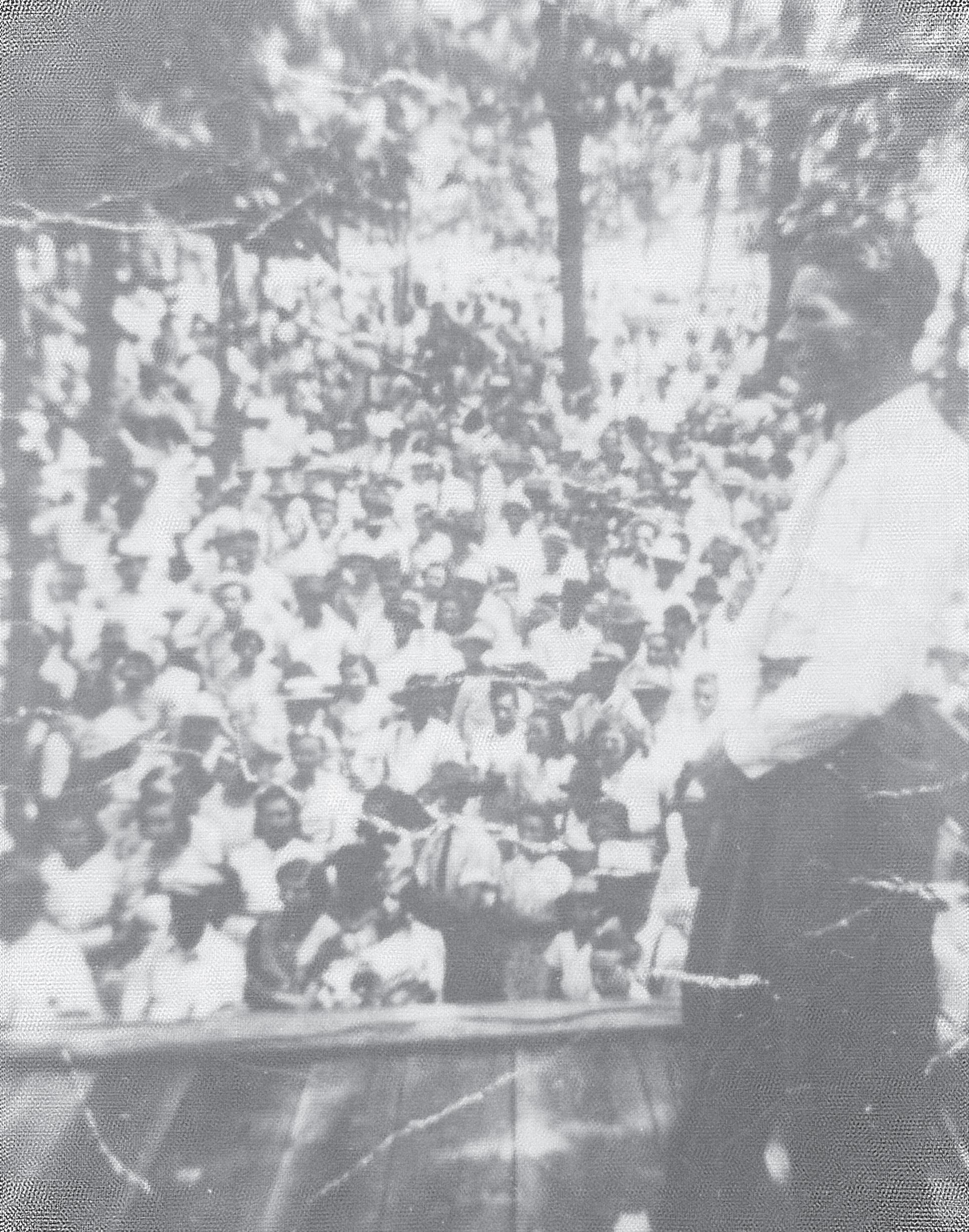
Speaker on platform in the 1920’s with crowd in the background.
In the 1920’s, the Barbecue changed venue again. It found itself near the Finger Cemetery on land owned by the family of the late James R. McIntyre, the brother of John A. McIntyre. On this property, the event was held for years. Many memories were made here. Vendors sold their goods and the smells of barbecue drifted through the trees and around the hollow and groves near the old McIntyre home. People continued to flock to Finger.
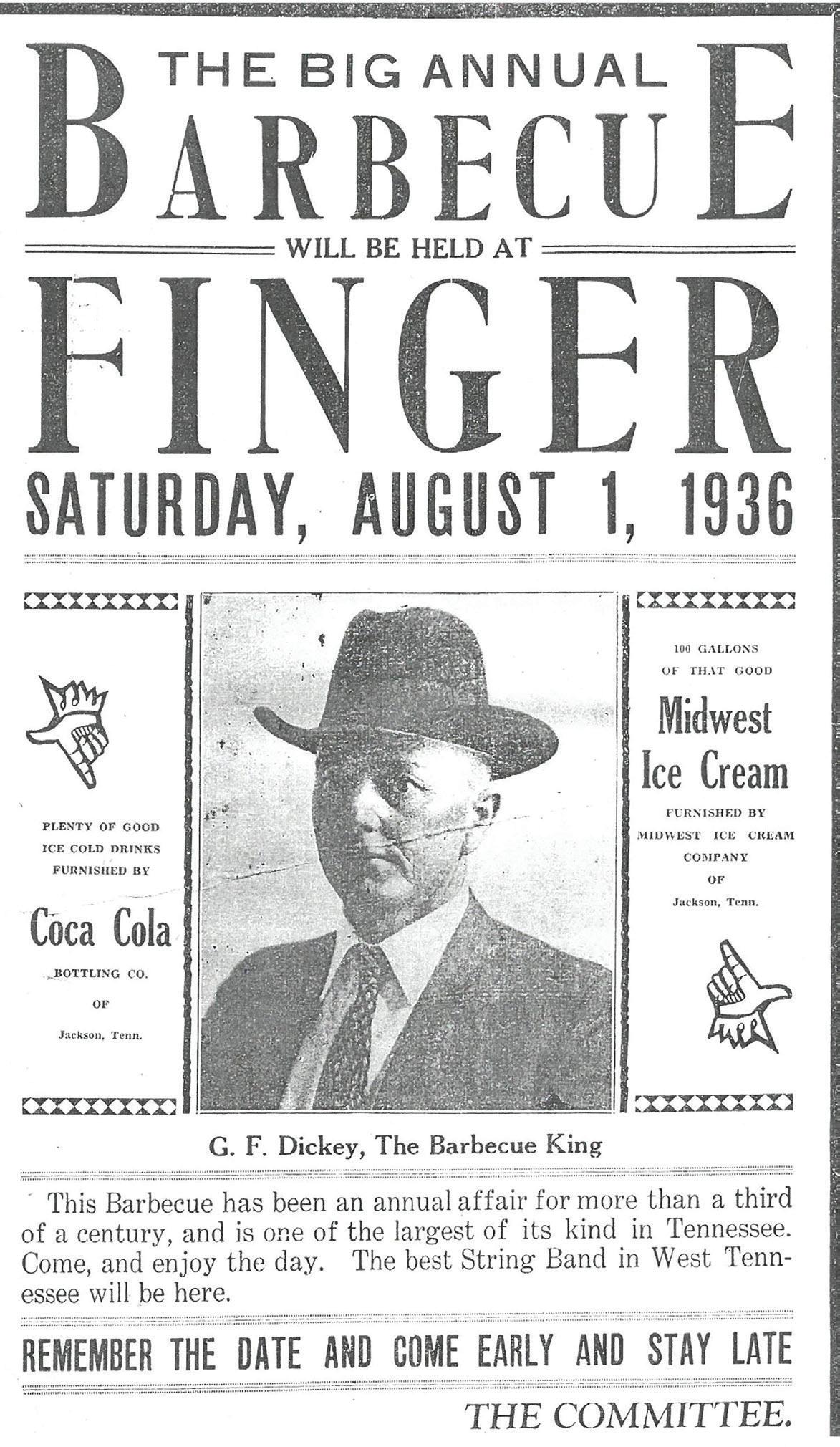
From the early 1920’s through 1943, the event continued to thrive and grow. Dickey could not do it all himself and so relied on a dedicated group of assistants. These men helped him in many ways. Hardy Leath, Robert M. Smith and John Rouse all practiced the art of the barbecue annually here. In 1924, they boasted, “We will barbecue forty big fat hogs, this year, with 15 nice fat sheep thrown in for a snack.” The food itself was a memorable thing for generations to come and many recalled into their old age the taste and smell of the meat roasting in and the smell of the smoke coming from the pit.
There were plenty of good cold snacks for youngsters and adults alike to enjoy. Over the years, flyers boasted 5,000 cases of cold drinks, six thousand gallons of ice cold lemonade and 2,000 gallons of cold ice cream, all a treat on a hot West Tennessee day. These treats were especially memorable for youngsters. Companies such as Midwest Dairy, Coca-Cola, RC Cola and many others provided cases and cases of their products to keep folks cool and their bellies full.
The Finger Barbecue continued to flourish, but in 1943, the death of Freelin Dickey left a huge void in the event and its planning. Others pledged themselves to continue the great event. One of those men was Jim Droke, whose wife was a niece of Freelin Dickey. During the 1950’s, Droke and his son George carried flyers and handbills all over West Tennessee trying to drum up support and attendance
for the event. The Finger Barbecue and Picnic hung on to life throughout the 1950’s and into the early 1960’s. However, times were changing. Television had come into being and families were starting to take vacations away from home, not going back home. The crowd was trickling off and the spirit of the local homecoming seemed to be ebbing away.
In 1964, it appeared it was over. For the first time since 1895, no Finger Barbecue was held. Times were indeed changing. 1964 turned into 1970 and still no Finger Barbecue was held. Indeed, this was the first break in tradition. The event continued through World War II despite world events. That changed in 1964. Indeed, for the first time in decades, the first Saturday in August was a quiet one in Finger, Tennessee and would continue to be for years.
In fact, at that point, the Finger Barbecue and Picnic became only a memory for some years. No longer would the politicians and hucksters walk around visiting with the people. For years, people came back from more than twenty-five to thirty states to visit. They looked forward to the first Saturday in August every year as they prepared to amble back down the paths of their own yesteryear. Yet beginning in 1964, it seemed it would be no more.
After the Barbecue faded from its former glory and passed into memory alone and a few years of inactivity had passed, the old spirit seemed to be reborn. In fact, though not of the same nature as the once festive Finger Barbecue and Picnic, a new festival was established. This new event was given the name of the “Finger Friendly Festival.” It was not promoted by a local resident for the same purposes. This new festival was promoted by the Memphis songwriter and singer, Eddie Bond. A friend and promotor of Finger native Buford Pusser, the singer was a natural born salesman. He promoted the new festival all over Memphis, Shelby County and north Mississippi. Bond’s friends, including local club and bar owners, bought advertising space in hastily prepared festival programs. Bond billed himself as the “Police Chief” of Finger, Tennessee and gave out officer’s commissions to friends and associates.
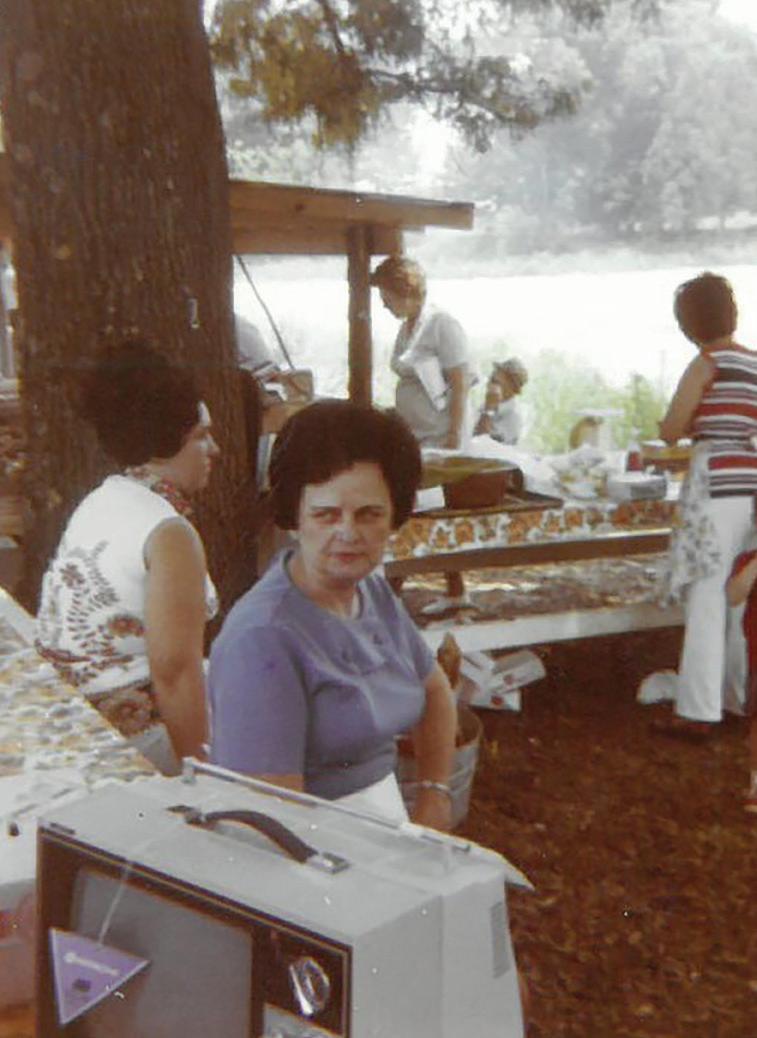
Evelyn Clayton Barham at the Finger BBQ, ca. 1971-1973.
From 1971 through 1973, both locals and out-oftowners were treated to wrestling matches, skydivers, fireworks, barbecue, politicians and more. Bond promoted himself by promoting his friend, the former McNairy County sheriff. The event, despite its inspiration or shortcomings, was still an excuse for people to come home and enjoy good food and better company among their old friends and close relations. The Finger Friendly Festival was sanctioned by the new municipal government of Finger, incorporated in 1970. The town aldermen saw the festival as a way to bring attention to their small town. The Festival was held in 1971, 1972 and 1973 but faded quickly after Pusser’s death.
Again, the Finger Barbecue and Picnic, went on a long hiatus. From 1974 through 1983, no event was held. Still, things were happening in Finger and it struggled to remain relevant in an ever-changing world. In the early 1980’s, a dedicated corps of volunteers was working to build a volunteer fire department. They started small, worked hard and struggled to find ways to fund their department and bring attention to their cause.
In 1984, these volunteers and other community leaders hit upon an idea. Why not sponsor and put on a community barbecue and picnic? Then and there, like the mythical phoenix arising from the ashes, the Finger Barbecue and Picnic was resurrected.
The final and present location for the Finger Barbecue was on the grounds of the old Finger School. It was here the event began again in 1984 to aid in the fundraising efforts of the new fire department.
Like the barbecue of old, it began with hopes and dreams and was built upon year after year. Those who once roamed the barbecue grounds as youngsters full of energy now returned as elderly people moving far slower but with hearts full of love and affection for their hometown. They brought their children, grandchildren and great-grandchildren and listened to music, ate good food and spent time with old friends and relations.
Since 1984, people have come back home to visit, eat those good barbecue sandwiches and homemade ice cream and meet plenty of politicians, each glad handing and making promises. For thirty-four years, the Finger Barbecue and Picnic has marched on keeping the spirit and ideas of the town’s founders alive. It has survived war, recessions and the Great Depression, naysayers and sometimes low attendance. Still, it persists.
Although nowhere near the scale of G.F. Dickey’s “Daddy of All Barbecues,” when thousands of people flocked to the barbecue grounds, it has still taken on some of the spirit of the barbecues of bygone times. Now held in October, it continues to maintain the flavor of its origins, a celebration of the town and people who hold it. It serves a purpose and no longer particularly as a fundraiser. Indeed, its purpose is far greater than anything of that nature. It holds a place in local history and culture. It is believed to be one of the oldest “continuing” such events in Tennessee. It is certainly the oldest in McNairy County and surrounding counties. It has carved its own place in local and regional history. Its continuation is a must. Out of the last 123 years, it has been held for 106 years.
Perhaps one day it will again ascend to the ranks of greatness among events, like that greatness that characterized it as a fine festival in the early years of the twentieth century. Perhaps just one day the spirit of Freelin Dickey, his Committee and the glory of the Finger Barbecue’s yesteryear will return, never to fade. With work and dedication to heritage, it just might be.
(Story submitted by John Talbott of Bethel Springs, TN.)





